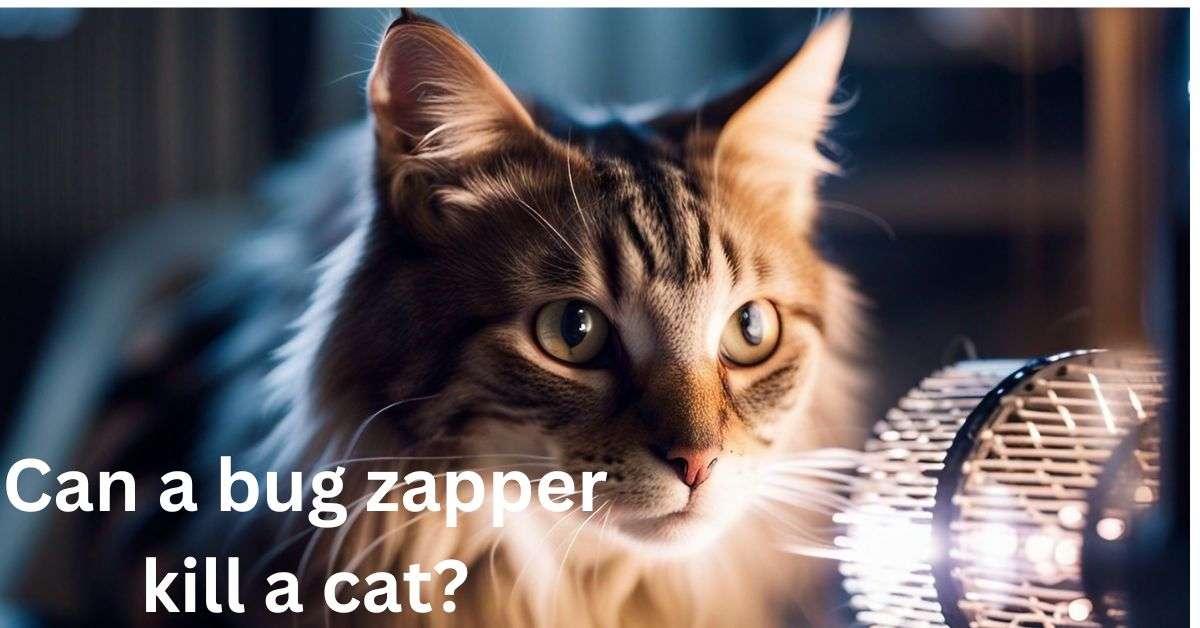Can A Bug Zapper Kill A Cat?
If you’re a cat owner, you might be wondering, ‘Can a bug zapper kill a cat?’ The good news is that the low current of bug zappers makes them generally safe for cats. However, direct contact may result in a painful shock for the feline. It’s advisable to place bug zappers in areas that are less accessible to pets to minimize any potential risks. Always prioritize your pet’s safety by being aware of their surroundings and taking precautions to prevent accidental contact with electrical devices.
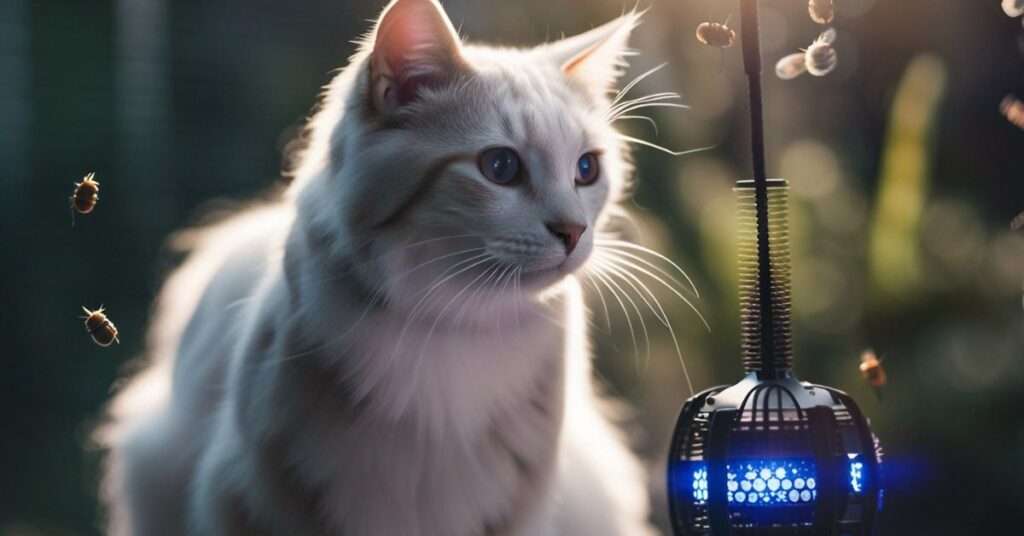
To safeguard curious cats, bug zapper designs are crafted to minimize the likelihood of contact with the electric grid. The grid is usually small and covered in plastic, preventing paws or fingers from making direct contact. Nevertheless, it remains essential to supervise your cat around bug zappers and ensure they are positioned out of reach.
Let’s understand Is Pura Safe for Cats?
Let’s understand Can A Bug Zapper Kill A Cat?
Let’s understand Can Cat Pee Get You High in 2024?
Let’s understand Why Is Cat Litter So Expensive in 2024?
A concern for pet owners is the possibility of their cat consuming insects caught by the bug zapper. Since insects may be toxic or have ingested harmful substances, it is imperative to keep the zapper away from your cat if they exhibit an interest in eating these deceased insects.
While bug zappers were once hailed as effective, recent discoveries indicate potential drawbacks, such as disrupting the local ecosystem by eliminating essential insects and attracting predators. If you seek alternatives, it is advisable to explore other methods and devices to maintain a bug-free home while prioritizing the safety of your feline companions.
Are Bug Zappers Bad For Cats?
In general, bug zappers are deemed safe for cats due to the incorporation of safety features that prevent direct contact with the electric grid. Despite their high voltage, the current flow is minimal, reducing the likelihood of causing harm to pets, including cats.
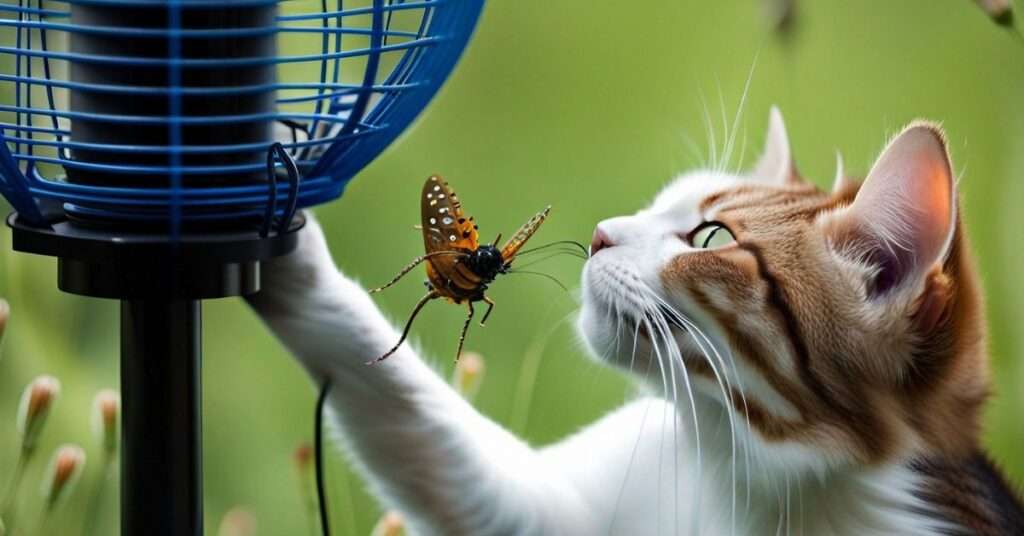
However, it remains crucial to keep bug zappers out of your cat’s reach to avoid any accidental harm. Can a bug zapper kill a cat? Cats, known for their curiosity, may attempt to paw or play with the zapper, posing a potential risk of a shock, although such incidents are highly improbable.
Furthermore, certain bug zappers emit high-pitched sounds that might disturb a cat’s sensitive ears, necessitating vigilant monitoring for any signs of distress in your feline companion. Can a bug zapper kill a cat? It’s essential to prioritize your cat’s safety and take preventive measures to ensure that they are not exposed to potential hazards associated with bug zappers.
Are Indoor Bug Zappers Safe For Pets?
Indoor bug zappers are generally regarded as safe for pets, including cats and dogs. The primary concern for pet owners may stem from the high voltage present in these devices, ranging from two thousand to four thousand volts. However, it is crucial to emphasize that it is the amps, rather than the voltage, that pose a risk to living beings. Most bug zappers maintain a current flow lower than that of household power outlets, rendering them non-hazardous.

Nevertheless, it remains imperative to keep bug zappers out of your pet’s reach, as their innate curiosity might lead them to paw at or investigate the device, potentially resulting in a mild electrical shock.
Let’s understand Is Pura Safe for Cats?
Let’s understand Can A Bug Zapper Kill A Cat?
Let’s understand Can Cat Pee Get You High in 2024?
Let’s understand Why Is Cat Litter So Expensive in 2024?
Moreover, both cats and dogs may be enticed to consume the insects attracted and killed by the zapper, posing a potential threat to their health. As a responsible pet owner, it is essential to ensure that the bug zapper is securely placed in a location away from your pet’s usual play area, thereby minimizing any risk of accidents.
Are Mosquito Zappers Safe For Pets?
Mosquito zappers are deemed safe for pets, including cats and dogs, provided they are utilized correctly and positioned out of reach. The voltage in a mosquito zapper is insufficient to cause harm to pets.
Additionally, the electric grids in most bug zappers are shielded with small plastic barriers, effectively preventing fingers and paws from coming into contact with the electricity.
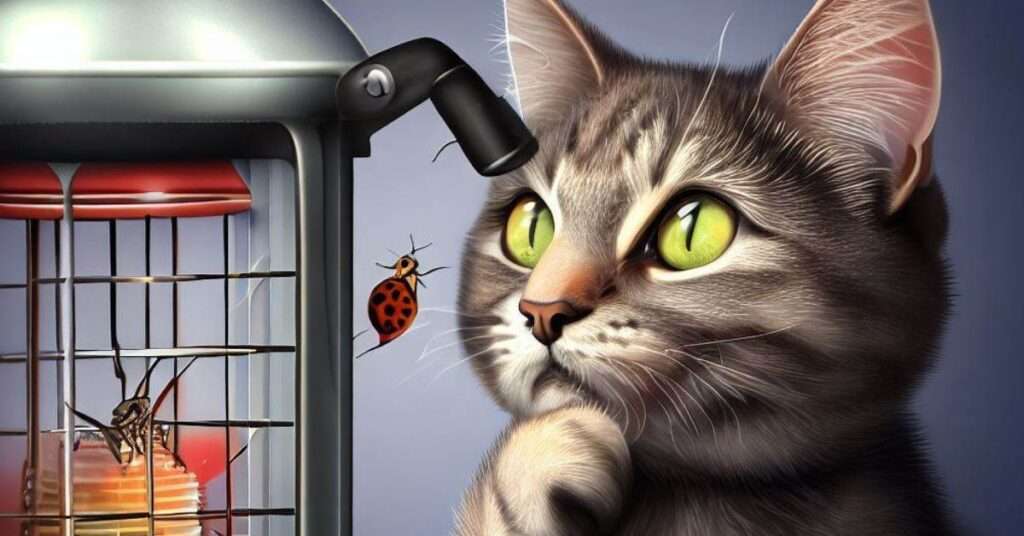
Nonetheless, it is crucial to implement the necessary precautions to avert accidents. Can a bug zapper kill a cat? Place the mosquito zapper in an area inaccessible to pets and maintain regular cleaning to prevent an accumulation of dead insects, which could pose a threat to your pets.
Can a bug zapper kill a cat? Particularly if your cat or dog has a penchant for consuming insects, be mindful that ingesting insects from the zappers can be detrimental, prompting the need for appropriate measures to deter such behavior.
Can a bug zapper kill a cat? It’s essential to prioritize the safety of your furry friends by taking proactive steps to minimize potential risks associated with bug zappers.
Can Cats Get Poisoned By Bug Spray?
Cats can indeed face poisoning from bug spray, as numerous insecticides and treatments commonly employed on lawns or for insect repellent purposes can pose harm to them. Household chemicals and flea treatments designed for dogs may also prove perilous or even fatal to cats. Mere contact with a treated lawn or treated pets can expose cats to these chemicals, leading to toxicity.

The symptoms of insecticide poisoning in cats can vary, encompassing manifestations such as drooling, trembling, vomiting, diarrhea, and, in severe cases, seizures. Can a bug zapper kill a cat? If there is a suspicion that a cat has encountered harmful insecticides, seeking immediate veterinary assistance is crucial.
Can a bug zapper kill a cat? Swift intervention is imperative for a more favorable prognosis, ensuring that any potential harm from insecticide exposure is addressed promptly and effectively. Can a bug zapper kill a cat? Being vigilant about your cat’s well-being and responding promptly to signs of poisoning is essential for their health and recovery.
Are UV mosquito Traps Safe For Cats?
UV mosquito traps are generally acknowledged as safe for cats. These devices employ ultraviolet light to attract insects, particularly mosquitoes, and either capture them on a sticky surface or electrocute them on a metal grid. The majority of UV mosquito traps are thoughtfully designed to be inaccessible to curious cats, thereby reducing the risk of potential injury.

The primary consideration regarding UV mosquito traps for cats involves their capability to emit high-pitched noises or bright flashes of light, which may prove bothersome or harmful to the sensitive ears and eyes of your feline companion. However, contemporary UV traps are often engineered with features aimed at minimizing noise and light emissions, prioritizing the comfort and safety of your pets.
How to Use Bug Zappers Safely?
Safely using a bug zapper is paramount for the well-being of both humans and pets, including your cherished cat. To establish a secure environment, it is imperative to diligently read the provided instruction manual for your bug zapper and adhere to the recommended safety measures. A comprehensive understanding of how bug zappers function will enable you to avert inadvertent harm to yourself and your furry companion.
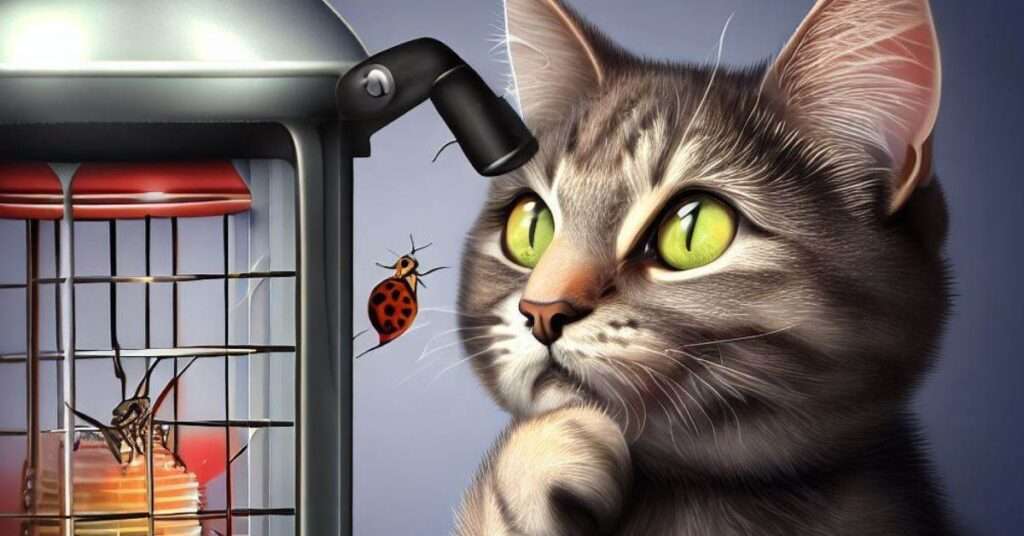
Strategic placement is vital when deploying bug zappers. Ensure that your bug zapper is situated in an area inaccessible to your cat, mitigating the risk of accidental contact with the electrical grid and the subsequent unpleasant shock. Regularly disposing of dead insects is essential to prevent enticing your cat to consume them, as certain insects may be detrimental to their health.
Prudent maintenance of your bug zapper is critical for its safe and efficient operation. Steer clear of direct contact with the electrical grid, and routinely inspect the device to confirm its proper functioning. By adhering to these guidelines, you can use a bug zapper with confidence, ensuring the safety of your cat and fostering a comfortable living space for both of you.
What Are Some Better Alternatives to Bug Zappers?
Various alternatives to bug zappers offer effective solutions for managing pesky insects while prioritizing the safety of our pets and the environment. One such alternative involves the use of citronella candles or torches. Citronella oil, known for its natural mosquito-repelling properties, can help deter mosquitoes when burned in candles or torches, enhancing outdoor spaces with a pleasant ambiance.

An eco-friendly approach involves introducing natural predators like bats and birds to your garden. Bats, in particular, are highly efficient at consuming mosquitoes and other undesirable insects. Installing bat houses or birdhouses in your yard can attract these creatures, fostering a natural means of insect population control.
Mosquito traps present another viable option, available for purchase or DIY projects. These traps utilize carbon dioxide and heat to attract and capture mosquitoes in a container. Strategically placing these traps around outdoor areas can significantly diminish mosquito numbers without causing harm to other insects or animals.
Let’s understand Is Pura Safe for Cats?
Let’s understand Can A Bug Zapper Kill A Cat?
Let’s understand Can Cat Pee Get You High in 2024?
Let’s understand Why Is Cat Litter So Expensive in 2024?
Personal mosquito repellents, such as sprays or creams, offer another line of defense. These products often contain DEET or other ingredients that deter mosquitoes without posing harm to the environment or your pet. Applying the repellent according to the packaging instructions and reapplying as needed is essential.
Lastly, maintaining a clean and well-kept outdoor space plays a pivotal role in preventing mosquito and insect infestations. Stagnant water in plant pots, birdbaths, or gutters can serve as ideal breeding grounds, so regular water changes and debris clearance are essential. By fostering a healthy outdoor environment, the reliance on bug zappers or other insect control methods can be significantly reduced
Conclusion
In conclusion, the question “Can a Bug Zapper Kill a Cat?” raises valid concerns among pet owners. While bug zappers are designed to be generally safe for cats due to their low current levels, direct contact may still result in a painful shock.

Pet owners must prioritize their feline companions’ safety by strategically placing bug zappers in less accessible areas. By being mindful of the potential risks and taking necessary precautions, such as monitoring pets’ interactions with these devices, owners can ensure a safer environment for their cats.
So, when considering the installation of bug zappers in your home, always keep in mind the well-being of your beloved feline friends and ask yourself, “Can a Bug Zapper Kill a Cat?” — a question worth considering for responsible pet ownership.
Frequently Asked Questions
Q: Can bug zappers harm my cat?
A: Bug zappers are generally considered safe for cats, employing high voltage with low amperage to target insects. However, there is a minimal risk of injury if a curious cat comes into contact with the zapper’s electric grid, potentially causing burns or a painful shock. To mitigate this risk, it is advisable to place the bug zapper out of your cat’s reach.
Q: What signs indicate bug zapper-related injuries in cats?
A: If your cat has encountered a bug zapper, signs of injury may include burns, pawing at the affected area, limping, or difficulty walking. In such instances, seek immediate veterinary care.
Q: How can I ensure my cat’s safety around bug zappers?
A: To safeguard your cat, install the bug zapper in an inaccessible location, or explore alternative methods for insect control. Closely supervise your cat when outdoors, and promptly remove any dead insects around the bug zapper, as they may attract your cat’s attention. Additionally, opt for a bug zapper with a protective grid covering the high-voltage area to reduce the risk of injury.
Q: Are bug zappers effective in controlling mosquitoes?
A: Bug zappers are designed to attract and eliminate a variety of flying insects, including mosquitoes. While they can be effective in reducing mosquito populations, their overall impact may vary depending on factors such as location, surrounding environment, and the specific bug zapper model.
Q: Can bug zappers be used indoors?
A: Bug zappers are primarily designed for outdoor use. Using them indoors may not be as effective, and the bright light and noise they produce could be disruptive. For indoor insect control, consider alternative methods such as traps or repellents designed for indoor use.
Q: Do bug zappers attract beneficial insects?
A: Bug zappers are not selective and may attract and eliminate both harmful and beneficial insects. As a result, their use may impact the local ecosystem by disrupting the natural balance. Consider alternative insect control methods that are more targeted and environmentally friendly.
Q: What is the lifespan of a typical bug zapper?
A: The lifespan of a bug zapper can vary depending on factors such as usage, maintenance, and quality. Regular cleaning of the device and replacement of bulbs, if applicable, can contribute to its longevity. Most bug zappers are designed to provide effective insect control for several seasons.
Q: Are there specific bug zappers recommended for households with pets?
A: Some bug zapper models are designed with features to minimize the risk to pets. Look for bug zappers with protective grids, elevated placement options, or those specifically labeled as pet-friendly. Always follow the manufacturer’s guidelines to ensure the safe use of the bug zapper in a household with pets.

